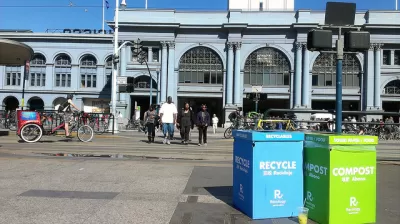In an effort to address climate change, San Francisco has a plan to get residents and businesses to do more than just recycle and compost.

Recycling and composting have long been a part of life in San Francisco. Now the city is leading the way with a no-waste initiative. It is asking other cities to join it in a commitment to decrease the amount of all waste and recyclables by 15 percent and the amount of material going to landfills by 50 percent by 2030.
To push beyond just recycling and composting, city leaders are coming up with ways to get more materials out of the waste stream. “Residents will have to voluntarily give up some of the stuff they buy, for example, and more pressure will have to be exerted on manufacturers to make things that don’t break down,” reports Kurtis Alexander.
San Francisco is hosting the Global Climate Action Summit, an event bringing together environmental activists and leaders from around the world, starting September 12. The Trump administration’s reversal of policies intended to curb climate change means more efforts are happening at the state and local levels:
Absent federal leadership, organizers of the San Francisco summit expect to roll out initiatives among cities, states and other subnational governments, as well as from businesses, with such climate goals as making buildings more energy efficient, increasing investment in environmentally friendly bonds and generating zero waste.
The city plans to promote its zero-waste initiative at the summit as a way to encourage other cities to reduce methane and energy use.
FULL STORY: S.F. invites world to join in zero-waste initiative

Maui's Vacation Rental Debate Turns Ugly
Verbal attacks, misinformation campaigns and fistfights plague a high-stakes debate to convert thousands of vacation rentals into long-term housing.

Planetizen Federal Action Tracker
A weekly monitor of how Trump’s orders and actions are impacting planners and planning in America.

In Urban Planning, AI Prompting Could be the New Design Thinking
Creativity has long been key to great urban design. What if we see AI as our new creative partner?

King County Supportive Housing Program Offers Hope for Unhoused Residents
The county is taking a ‘Housing First’ approach that prioritizes getting people into housing, then offering wraparound supportive services.

Researchers Use AI to Get Clearer Picture of US Housing
Analysts are using artificial intelligence to supercharge their research by allowing them to comb through data faster. Though these AI tools can be error prone, they save time and housing researchers are optimistic about the future.

Making Shared Micromobility More Inclusive
Cities and shared mobility system operators can do more to include people with disabilities in planning and operations, per a new report.
Urban Design for Planners 1: Software Tools
This six-course series explores essential urban design concepts using open source software and equips planners with the tools they need to participate fully in the urban design process.
Planning for Universal Design
Learn the tools for implementing Universal Design in planning regulations.
planning NEXT
Appalachian Highlands Housing Partners
Mpact (founded as Rail~Volution)
City of Camden Redevelopment Agency
City of Astoria
City of Portland
City of Laramie


























